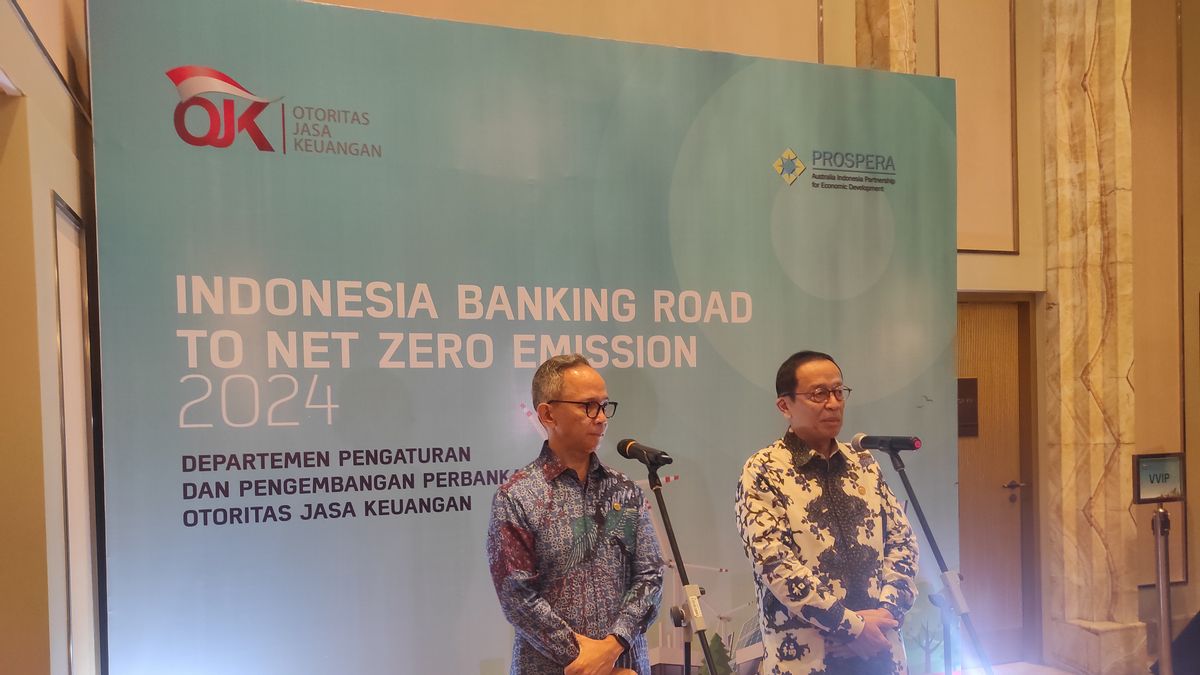JAKARTA - The Financial Services Authority (OJK) launched a climate risk management and scenario management (CRMS) guide or climate risk management and scenario analysis for the banking sector in climate management risk management.
Chief Executive of Banking Supervision of the Financial Services Authority (OJK), Dian Ediana Rae revealed that the preparation of this CRMS guide was motivated by 3 main urgencys. First, in terms of risk, Indonesia is a country that is considered quite vulnerable to the issue of climate change.
"Indonesia ranks third as the country with the largest physical risk in the world. Meanwhile, from the transition risk, Indonesia is ranked 7th in the world with the highest carbon emissions with a share of 2.3 percent," he explained at the Launch of CRMS in Jakarta, Monday, March 4, 2023.
The second urgency is the global commitment to achieving NZE in 2050 which was announced at the Paris Agreement and was lowered to NZE Indonesia's target in 2060 or sooner.
Dian revealed that in COP 28, this commitment was even stronger with the initiative of various funding for climate change. In addition, other policies have also begun to be implemented, such as limiting the use of fossil energy and carbon taxes.
According to Dian, this will have an impact on the economic landscape and the business world, especially in sectors that fall into the carbon-intensive category.
Meanwhile, the next urgency regarding the banking sector, The Basel Committee on Banking Supervision (BCBS) has issued a Consultative Document "Principles for the Effective Management and Supervision of climate-related financial risk" which encourages the banking sector to start integrating climate risks into financial performance, including its disclosure.
Furthermore, Dian added that this was reinforced by the existence of model development initiatives as the basis for measuring the impact of climate risk by the Central Banks and Supervisors Network for Greening Financial System or NGFS which is the Central Bank Association and Supervisory Authority in the world in driving responses to the issue of the climate/achieving the Paris Agreement.
To support this, the International Sustainability Standard Board (ISSB) has issued IFRS Sustainability Disclosure Standards S1 and S2 which are the standard for disclosing climate risks and opportunities for public entities, including banks.
Meanwhile, in the implementation of an assessment by the Financial Sector Assessment Program (FSAP) in Indonesia in 2023, climate risk management in the financial services sector will also be an issue of preliminary recommendations to be encouraged towards strengthening bank capacity and regulators to develop climate risk management.
SEE ALSO:
In line with the direction of global policy, several countries in the world have initiated the implementation of climate risk management in their financial sectors, including the United States, Britain, European Union, Australia, United Arab Emirates, Hong Kong, Singapore, and Malaysia.
Dian conveyed that these countries have issued guidance for the development of climate risk management and have conducted stress tests on banks and other financial industries, some of which have even published the results of their climate risk stress tests.
Meanwhile, according to Dian, the initiation of liquidance development related to climate risk management in Indonesia itself has been started since 2023 through the issuance of limited initial guidance.
"Furthermore, it is developed to be more comprehensive as outlined in the 2024 Climate Risk Management and Scenario Analysis (CRMS) Guideline document," he said.
The English, Chinese, Japanese, Arabic, and French versions are automatically generated by the AI. So there may still be inaccuracies in translating, please always see Indonesian as our main language. (system supported by DigitalSiber.id)
















